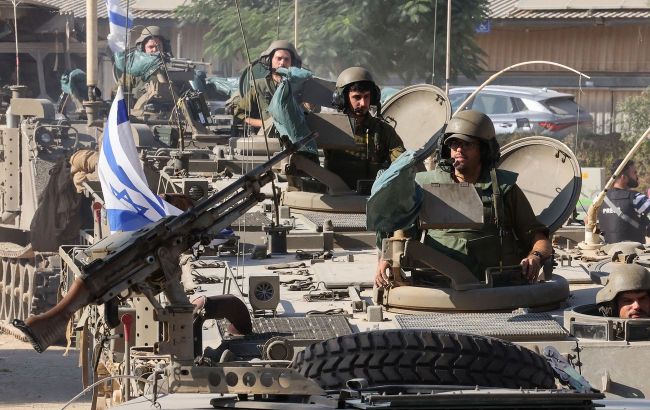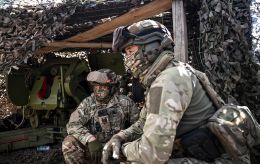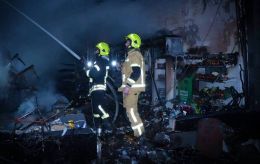Everyone against everyone: What's happening in Israel and around the world after outbreak of war in the Middle East
 Israeli military near the border with the Gaza Strip (Photo: Getty Images)
Israeli military near the border with the Gaza Strip (Photo: Getty Images)
At the beginning of the third week of the conflict in Israel and the Gaza Strip, there are no prospects for a swift conclusion to hostilities; rather the opposite. The conflict has not yet spilled beyond the region but has already taken on a global character. More details can be found in the review by RBC-Ukraine.
Despite the significant number of events, statements, threats, promises, and other news accompanying the war between Israel and Hamas, the overall picture has remained unchanged for several days. Israel continues to launch massive airstrikes on the Gaza Strip, while Hamas and its allies continue to fire rockets into Israel. World leaders are engaged in negotiations with the Israeli government, Palestinians, Middle Eastern countries, and each other, but with little to no result. Even the delivery of limited humanitarian aid to Gaza cannot be agreed upon, and the death toll in the war continues to rise.
What's happening in Israel and the Gaza Strip
The primary question that will determine the further course of the conflict in Gaza is when and how the ground phase of the military operations will commence. Expectations for this phase have existed since the first days of the attack on Israel by Hamas militants. There have even been rumors in Israel that the Israel Defense Forces (IDF) might not enter the Gaza Strip at all.
However, Israeli officials categorically deny this, stating that Israel is currently accumulating forces and conducting shaping operations to weaken Hamas and other terrorists' defenses before the ground phase begins. The targeting and elimination of Hamas leaders have become relatively routine news. "You see Gaza now from a distance, you will soon see it from inside. The command will come," Israel's Defense Minister Yoav Galant told IDF soldiers on October 19.
On the eve of Reuters reported, citing its sources, that the Israeli government allegedly didn't know what to do after the conclusion of the ground phase of military operations. Even if the operation were successful and Hamas were defeated, the question remained of what to do next with the devastated Gaza Strip. Annexation was not an option; it had never been a goal for Israel from the beginning. Moreover, even for such a powerful economy, the prospect of rebuilding the region and providing for the war-torn Gaza and its substantial population seemed unrealistic and even absurd.

The Iron Dome system in southern Israel (Photo: Getty Images)
However, Yoav Galant stated that the operation in the Gaza Strip would have three stages in general: an aerial and ground phase, the elimination of pockets of resistance from the militants, and then "the removal of Israel’s responsibility for life in the Gaza strip, and the establishment of a new security reality for the citizens of Israel." However, it remains unclear how the third stage will be realized in practice, so that after the IDF's withdrawal from Gaza, this territory does not once again become a hub for terrorism.
According to Bloomberg, the United States influenced the preparation for the IDF's ground operation in the Gaza Strip, somewhat cooling the initial assessments of the Israeli leadership. The agency also reports that Americans and Europeans are requesting a postponement of the operation's start to free at least some of the hostages held by Hamas. Secret negotiations through Qatar mediation are ongoing, and two American citizens have already been successfully released.
The most significant event in recent days of the war is the shelling of the Al-Aqsa Hospital in Gaza, with the number of casualties ranging from dozens to hundreds. Hamas blamed Israel for this, while Tel Aviv stated that a rocket fired by the Islamic Jihad into Israel hit the hospital (on average, about one-third of all rockets launched by militants into Israel end up falling within the Gaza Strip).
 The consequences of the strike on Al-Aqsa Hospital (Photo: Getty Images)
The consequences of the strike on Al-Aqsa Hospital (Photo: Getty Images)
The information from American intelligence – satellite images, videos, and photos from the scene, intercepted conversations of the militants – preliminarily confirm that the rocket launch was carried out from the positions of Palestinian militants within the Gaza Strip. However, the Arab world and the Muslim community, in general, have supported the position of Hamas.
As a result of these events, the planned October 18 negotiations of U.S. President Joe Biden with the leaders of Egypt, Jordan, and the Palestinian Authority were canceled (referring to the leader of the Palestinian Fatah party, which effectively controls only the West Bank of the Jordan River and is generally in hostile relations with the Hamas in the Gaza Strip).
What is happening in the world as the war between Israel and Hamas is raging
The main military actions are currently taking place in the Gaza Strip, although it remains tense in northern Israel and on the West Bank of the Jordan River. In fact, from the first day of the war, Hezbollah militants intensified shelling in the border areas of Israel, and the Israel Defense Forces (IDF) responded with strikes. In addition, Israeli security forces are conducting operations on the West Bank, apprehending local Hamas militants. Only on October 20, during these operations, several dozens of terrorists were detained, and 13 Hamas members were eliminated, including an Israeli officer.
Furthermore, Israel carried out preemptive strikes on the Syrian airports of Damascus and Aleppo, from which reinforcements or weapons could be transferred to Hezbollah. In response, U.S. airbases in Syria and Iraq were attacked from the air, and American forces shot down rockets over the Red Sea that were launched toward Israel from Yemen by the Houthi group, aligned with Iran.
Despite these events, it cannot be said that the military conflict has truly spilled beyond the borders of the Gaza Strip and its vicinity, becoming a full-fledged regional conflict. Paradoxically, the war between Israel and Hamas has acquired a global dimension, albeit not in terms of a direct military conflict.
Throughout the world, protest actions have taken place, not only in Arab or predominantly Muslim countries. Protesters in Turkish Istanbul attempted to storm the Israeli consulate, and large-scale anti-Israeli rallies were held in Lebanon, Morocco, Iran, Iraq, and other countries. Interestingly, the support for Palestinians from other Arab societies has clear limits. According to Reuters, they fear a potential influx of refugees from the Gaza Strip who might permanently remain in their countries. According to Egyptian President Abdel Fattah el-Sisi, millions of his compatriots may protest against receiving refugees.
Anti-Israeli protests have also occurred in several European cities. In Berlin, despite a ban, protests escalated into clashes with the police. The United States, which traditionally considers itself the main ally of Israel in the world, also saw unrest. The government even issued a global warning to Americans worldwide to be especially cautious due to the threat of attacks. About three hundred participants of an anti-Israeli rally were detained at the U.S. Capitol in Washington. Obviously, not all of them were Arabs or Muslims but took part in supporting the Palestinians (and, correspondingly, protesting against Israel) for various ideological reasons.
 During an anti-Israeli protest in Berlin (Photo: Getty Images)
During an anti-Israeli protest in Berlin (Photo: Getty Images)
This illustrates the globalization of the Israeli-Palestinian conflict, involving people from different parts of the world who may not have a direct connection to either side of the conflict. For instance, sponsors of several prestigious American universities like Harvard and Princeton are withdrawing their funding due to student actions in support of Palestinians and against Israel.
According to The New York Times, many American Jewish activists from left and liberal movements, who had previously criticized Israel's policies towards Palestinians, have unexpectedly faced backlash from their allies. They are now being held responsible for the ongoing operations in the Gaza Strip and are called upon to recognize Israel as an apartheid state, or even to support Hamas's actions and calls for the destruction of Israel.
This potential division among American leftists, who mostly support the Democratic Party, could have far-reaching consequences in the context of future elections, especially if the conflict in the Middle East escalates.
 Israeli soldiers near the border with Lebanon (Photo: Getty Images)
Israeli soldiers near the border with Lebanon (Photo: Getty Images)
This scenario appears to be inevitable, with the only question being the extent of escalation. The further course of events depends on two factors. The first is how successful and how long the ground operation in the Gaza Strip will continue. The second is whether the opening of a second front will follow, likely in northern Israel, instigated by Hezbollah and supported by Iran. In terms of military capabilities, Hezbollah is a significantly more formidable force than Hamas.

